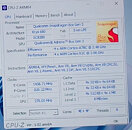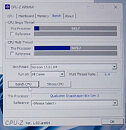- Joined
- Oct 9, 2007
- Messages
- 47,890 (7.38/day)
- Location
- Dublin, Ireland
| System Name | RBMK-1000 |
|---|---|
| Processor | AMD Ryzen 7 5700G |
| Motherboard | Gigabyte B550 AORUS Elite V2 |
| Cooling | DeepCool Gammax L240 V2 |
| Memory | 2x 16GB DDR4-3200 |
| Video Card(s) | Galax RTX 4070 Ti EX |
| Storage | Samsung 990 1TB |
| Display(s) | BenQ 1440p 60 Hz 27-inch |
| Case | Corsair Carbide 100R |
| Audio Device(s) | ASUS SupremeFX S1220A |
| Power Supply | Cooler Master MWE Gold 650W |
| Mouse | ASUS ROG Strix Impact |
| Keyboard | Gamdias Hermes E2 |
| Software | Windows 11 Pro |
Qualcomm Snapdragon 8cx Gen 3 is a high performance Arm SoC designed to compete with Apple M3, with Windows 11 thin and light notebooks and Chromebooks being its main target devices. Microsoft pins a lot of hope in chips such as the Snapdragon 8cx series as they offer comparable performance and battery life to the current crop of M3 MacBooks. A lot of water has flown under the bridge since Windows RT, and the latest crop of Windows 11 for Arm has a much wider PC application support base thanks to official translation layers by Microsoft. CPUID has an Arm64 version of the popular CPU-Z utility, which correctly detects all the specs of the Snapdragon 8cx, but more importantly, has a Bench tab that can test the single- and multithreaded performance of the CPU.
A Chinese tech enthusiast wasted no time in putting the Snapdragon 8cx through this CPU-Z internal benchmark, and found surprisingly good performance numbers. The single-threaded bench, which loads one of chip's four Arm Cortex-X1C P-cores, registers a score of 543.7 points. This is roughly comparable to that of the AMD "Zen 2" or Intel "Comet Lake" x86-64 core. The multithreaded test, which saturates all four P-cores, and all four Cortex-A78C E-cores, springs up 3479.7 points, which again compares to entry/mainstream x86-64 processors from AMD or Intel. Not impressed? How about the fact that the Snapdragon 8cx Gen 3 is a 7 W chip that idles under 2 W for the most part, and can make do with passive cooling, posting scores comparable to 35 W x86 chips that need active cooling?


View at TechPowerUp Main Site | Source
A Chinese tech enthusiast wasted no time in putting the Snapdragon 8cx through this CPU-Z internal benchmark, and found surprisingly good performance numbers. The single-threaded bench, which loads one of chip's four Arm Cortex-X1C P-cores, registers a score of 543.7 points. This is roughly comparable to that of the AMD "Zen 2" or Intel "Comet Lake" x86-64 core. The multithreaded test, which saturates all four P-cores, and all four Cortex-A78C E-cores, springs up 3479.7 points, which again compares to entry/mainstream x86-64 processors from AMD or Intel. Not impressed? How about the fact that the Snapdragon 8cx Gen 3 is a 7 W chip that idles under 2 W for the most part, and can make do with passive cooling, posting scores comparable to 35 W x86 chips that need active cooling?


View at TechPowerUp Main Site | Source





